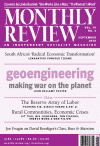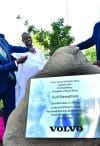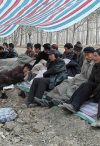2018

In this excerpt from his forthcoming title, Can the Working Class Change the World?, Yates details the historical development of the working class—its potential for (and barriers to) unity, and how it is still the only force in society that can bring about its fundamental, radical transformation. | more…

A new poem by Marge Piercy, author of many books of poetry—most recently Made in Detroit. | more…

There is considerable debate within China about the nature of the economy, including recognition of tendencies toward state capitalism. Consequently, most writers focus theorization of the many possible paths the economy could take—whether toward or away from capitalism. The present article takes a step further, arguing that the Chinese system today still contains some key components of socialism and is compatible with a market, or market-based, socialism that is clearly distinct from capitalism. | more…

The modernization paradigm pursued by China has tended to privilege industry over agriculture, urban over rural, and the middle class over the subaltern, with the country’s growth statistics and policy emphases accordingly geared to such a paradigm. This has resulted in almost mindless degradation of nature. The key question China faces is thus not one of more progress or more growth, but of the multiple tasks of reversing the dire damage already done to its ecology, society, and culture. | more…

In his review of Hardboiled Activist: The Work and Politics of Dashiell Hammett by Ken Fuller, Albert Ruben debunks popular arguments about Hammett’s consistent radicalism. Instead, he highlights Fuller’s research to point to Hammett’s process of radicalization—from nihilism to communism—and the events that shaped his life and work. | more…

Founded in the late 1960s and recently revived, the radical organization Science for the People did—and does—far more than just publish a magazine. Chapters are forming around the country, including physicists, engineers, and biologists, as well as representatives of other scientific groupings and social movements. We at MR welcome the return of this great publication and movement of the U.S. left. | more…

Geoengineering and Capitalism's Creative Destruction of the Earth
The dangers posed by climate change have inspired a desperate search for technological fixes in the form of geoengineering—massive human interventions to manipulate the entire climate or planet. But as long as the dominant strategy for addressing global warming remains subordinated to the ends of capital accumulation, any attempt to implement such schemes will prove fatal to humanity. | more…

The South African political class appears to have finally recognized the depth of the crisis into which the country’s capitalist system has sunk. Can the government’s new Radical Economic Transformation program begin to address the profound inequalities that remain at the heart of South African society? | more…

Since the late 1990s, China’s economic expansion has depended on an immense pool of cheap labor. Today, as wages increase and manufacturing operations leave the country, there are constant complaints about shortages of peasant workers. But has China really entered a new era of labor shortage? | more…

Throughout China’s nearly seventy-year history of industrialization and financialization, whenever the cost of an economic crisis could be transferred to the rural sector, capital-intensive urban industries have had a “soft landing” and existing institutional arrangements have been maintained—a pattern that continues today. We argue that Chinese peasants and rural communities have rescued the country from no fewer than ten such economic crises. | more…

Linda Backiel is a criminal defense attorney practicing in San Juan, Puerto Rico. | more…

A Letter to István Mészáros from Paul M. Sweezy, October 16, 1992
In October 1992, MR founding editor Paul M. Sweezy wrote the following brief letter, published here for the first time, to István Mészáros in response to an interview with Chris Arthur and Joseph McCarney that had just been published in Radical Philosophy. Sweezy saluted the critical significance of Mészáros’s argument on “the monstrous power of capital,” and the failure of many Marxists to perceive this problem in its full dimensions. He also affirmed the imperative of incorporating the ecological economics of Nicholas Georgescu-Roegen.

In his insightful new book, the historian David Roediger raises critical questions for scholar-activists seeking to understand white racism and contemporary capitalism and its class realities. He joins a long line of thinkers who have clearly recognized the need for both specifically racial and more universal, class-oriented programs of major social and economic change. | more…












